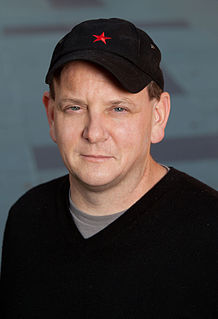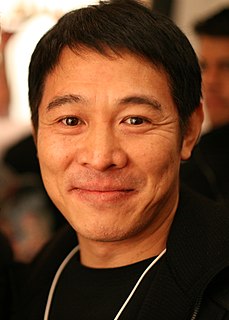A Quote by Miles Millar
It's [Into the Badlands] something that's very, very different and I think that's why it divided critics initially because they didn't understand it or get it. They didn't understand or have a knowledge of what we were trying to do. Bringing in the Asian martial arts aesthetic to American television. For us, these are the people who will make the show a hit or a failure in future seasons. So it's for us to respect them and interact and see what they have to say.
Related Quotes
Also, when we did "Smallville," we didn't have an opportunity to interact with people who watched the show. And see what they had to say and listen to criticism and listen to praise at the same time. So a lot of this is a new experience and it's very interesting and rewarding for us. I think we get honest feedback. You get hate. You get a lot of love as well. And I'm actually very curious what people think of the show. For us, it's been a passion project of ours, and an incredibly challenging show to make.
[Into the Badlands] wasn't going to be two days of a splinter unit at the end of the shoot. The action and the martial arts had to be integral to the show. That's what makes it unique, that's what makes it special and different and ground-breaking. No one has attempted this before on American television.
Miles and I had been looking to do a martial arts show for some time. Our first two movies that we wrote were "Lethal Weapon 4" and "Shanghai Noon" with Jackie Chan. Then we sort of got pulled into the superhero world, but then you look around at what's not on television and there wasn't really a martial arts shows. There are shows that do martial arts to a degree, but there's not a martial arts show.
There's a very famous Miyamoto Musashi quote. "Once you understand the way broadly, you can see it in all things." The idea is once you understand what excellence is all about, whether it's in painting, or carpentry or martial arts, that you see how that excellence manifests itself in any discipline. I think that all the different things that I do enhance all the other things that I do.
We don't understand what photography is doing. We don't understand the power of its rhetoric. We don't understand why the Provoke photographers showed Tokyo city as a ghastly and alien city when it was really going through this period of mega-capitalist growth. It's a very, very, very powerful force, the photograph. People ask me why it has such an ability to captivate us. And I just don't know.
There's always someone kicking guns. We wanted ["Badlands"] to be a world without guns and bullets, where martial arts was the form of fighting and defense and attack. Martial arts is king in this world. That was the first thing. We didn't want it to be a period piece either. We felt those are overdone and stuffy. That was what lead us to explore that area of science fiction and future, a world we can create and control.
I know Donald's [Trump] trying very hard to plant doubts about it, but I hope the people out there understand: This election's really up to you. It's not about us so much as it is about you and your families and the kind of country and future you want. So I sure hope you will get out and vote as though your future depended on it, because I think it does.
Let me tell you about the very rich. They are different from you and me. They possess and enjoy early, and it does something to them, makes them soft where we are hard, and cynical where we are trustful, in a way that, unless you were born rich, it is very difficult to understand. They think, deep in their hearts, that they are better than we are because we had to discover the compensations and refuges of life for ourselves. Even when they enter deep into our world or sink below us, they still think that they are better than we are. They are different.
I see a world in the future in which we understand that all life is related to us and we treat that life with great humility and respect. I see us as well as social creatures, and when I began to look back and say, ‘what is the fundamental bottom line for us as social creatures?’I couldn’t believe it because it seemed so hippy dippy, but it was Love. Love is the force that makes us fully human.
In my mind, martial arts movies are martial arts movies and action is action. It's quite different, because martial arts doesn't just have physical form; you have a philosophy, internal and external. A lot of it involves your life. How you see the world. An action film I think is just about the movement. I think it's different.
The arts and humanities define who we are as a people. That is their power -- to remind us of what we each have to offer, and what we all have in common. To help us understand our history and imagine our future. To give us hope in the moments of struggle and to bring us together when nothing else will.



































